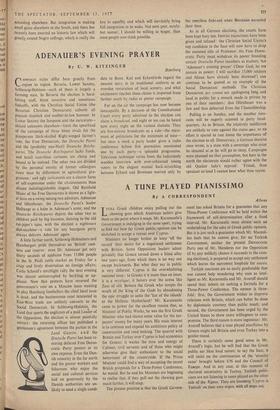ADENAUER'S EVENING PRAYER
By U. W. KITZINGER CAMPAIGN styles differ here greatly from region to region. Bavaria, Lower Saxony, Schleswig-Holstein—each of them is largely a farming state. In Bavaria the election is hard- hitting stuff, blunt invective and sometimes fisticuffs, with the Christian Social Union (the Bavarian Christian Democrats) cabaret all Peasant slapstick and mother-in-law humour. In Lower Saxony the lampoon and the caricature— almost unknown elsewhere—form the spearhead of the campaign of three bitter rivals for the prosperous thick-skulled Right-winged farmer's vote, the Free Democrats, the Deutsche Partei and the (probably neo-Nazi) Deutsche Reichs- partei. The Deutsche Reichspartei lacks funds, and t mall scurrilous cartoons are cheap and bound to be noticed. The other two are divided by the personal enmity of former colleagues more than by differences in agricultural pro- gramme : and ugly caricatures are a clearer form of self-expression under the circumstances than almost indistinguishable slogans. Old Reinhold Maier of the Free Democrats is shown as a light- o'-love on a swing teasing two admirers, Adenauer and 011enhauer, the Deutsche Parters leader Hellwege as a babe in Adenauer's arms; and the Deutsche Reichspartei depicts the other two as children paid by big business, dancing to the old rat-piper's tune, with the election a nightmare slot-machine—a vote for any bourgeois party always delivers Adenauer again.
A little farther north, Schleswig-Holsteiners and Hamburgers pride themselves on 'British' cool- ness and reserve : even Dr. Adenauer got only thirty seconds of applause from 15,000 people in the St. Pauli cattle market on Friday for a crisp and lively dissertation on foreign affairs; Carlo Schmid's torchlight rally the next evening was almost uninterrupted by heckling or ap- plause. Now that protests have reversed the government's veto on a Moscow team wanting to play Hamburg footballers the chief local issue ts dead; and the businessmen most interested in East-West trade are unlikely converts to the Social Democrats. In Schleswig-Holstein, the Land that sports the anglicism of a paid Leader of the Opposition, the election is almost painfully correct : the returning officer has published a gentlemen's agreement between the parties in the Land Gazette, a n d the peutsche Partei has been re- storing defaced Free Demo- cratic Party posters at its own expense. Even the Dan- ish minority in the far north and the poorer workers and fishermen who enjoy the social and cultural services laid on generously by the Danish authorities are un- likely to send a single candi- Hamburg date to Bonn. Kiel and Eckenforde regard the nascent navy in its traditional uniform as an overdue restoration of local scenery, and what excitement reaches these climes is imported from farther south by radio or poster campaign.
For on the air the campaign has now become inescapable. By a decision of the Constitutional Court every party admitted to the election can claim a. broadcast, and eight or ten can be heard now every night on the various stations. They are five-minute broadcasts as a rule—the maxi- mum of politicians for the minimum of time— but once a week a party leader gives a radio conference before five journalists nominated one by each party—a splendid programme. Television technique varies from the ludicrously wooden interview with over-rehearsed young voters to the elegant mutual back-scratching between Erhard and Brentano marred only by the merciless fade-out when Brentano exceeded their time.
As in all German elections, the courts have been kept busy too. Interim injunctions have been given and refused : the Christian Social Union's top candidate in the Saar will now have to drop the assumed title of Professor; the Free Demo- cratic Party must. withdraw its poster branding certain Deutsche Partei members as traitors; but `Adenauer's evening prayer' (Dear God, let me remain in power; I will sacrifice 15,000 soldiers and fifteen have already been drowned') can continue to be quoted as an example of the Social Democrats' methods. The Christian Democrats per contra are apologising long and loud in public for a remark made in private by one of their members : that 011enhauer was a Jew and thus debarred from the Chancellorship.
Polling is on Sunday, and the weather fore- casts will be eagerly scanned in party head- quarters. As in Britain, the relatively indifferent are unlikely to vote against the status quo, so no effort is spared to ram home the importance of the election to all. Democracy, a German theorist once wrote, is a state with a sovereign who must be shouted at or he will go to sleep. Campaigns were planned on that assumption, but here in the north the electorate \could rather agree with the old Quaker lady's reproof : 'Friend, thou speakest so loud I cannot hear what thou sayest.


































 Previous page
Previous page